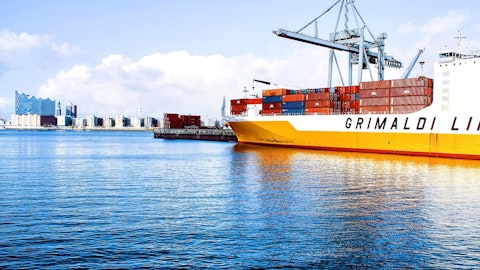Below we present the list of 5 Countries that Produce the Most Plastic Waste. For our methodology and a more comprehensive list please see 15 Countries that Produce the Most Plastic Waste.
5. Nigeria
Mismanaged Plastic Waste (MPW) Created in 2021 (in tons): 1.95 million
MPW Created in 2016 (in tons): 1.66 million
Plastic waste is a major environmental problem in Nigeria, as in many other countries around the world. Nigeria is one of the largest producers of plastic waste in Africa, with an estimated 3 million tons of plastic waste generated annually. The majority of this plastic waste is not properly managed and ends up in landfills, streets, and waterways, where it can cause a range of environmental and health problems.
One of the main sources of plastic waste in Nigeria is the use of single-use plastics, such as plastic bags, straws, and bottles. These items are often used once and then discarded, leading to a large volume of plastic waste that is difficult to manage. In addition, the lack of adequate infrastructure for waste management, including garbage collection and recycling facilities, contributes to the problem of plastic waste in the country.
4. Brazil
Mismanaged Plastic Waste (MPW) Created in 2021 (in tons): 3.3 million
MPW Created in 2016 (in tons): 10.7 million
Brazil is one of the largest producers of plastic waste in South America, with an estimated 11 million tons of plastic waste generated annually, but has taken big strides in recent years to improve how much of that waste is properly managed.
Some of the country’s efforts have included raising awareness about the environmental impacts of plastic waste, implementing bans on certain single-use plastics, and promoting the use of more environmentally-friendly alternatives.
3. Philippines
Mismanaged Plastic Waste (MPW) Created in 2021 (in tons): 4.03 million
MPW Created in 2016 (in tons): 1.54 million
Mismanaged plastic waste in the Philippines has more than doubled since 2016, vaulting the country into the unenviable position of being the third-highest producer of MPW on the planet. The environmental impacts of plastic waste in the Philippines are significant. Plastic waste can litter streets and waterways, where it can be harmful to wildlife and ecosystems. In addition, when plastic waste decomposes, it releases toxic chemicals into the environment, which can have negative impacts on human health.
Among other things, the Philippine government has encouraged the use of reusable bags as an alternative to single-use plastic bags and some supermarkets and retail stores have implemented programs to encourage the use of reusable bags by offering discounts or rewards to customers who bring their own bags. Clearly, a lot more needs to be done however.
2. China
Mismanaged Plastic Waste (MPW) Created in 2021 (in tons): 12.3 million
MPW Created in 2016 (in tons): 21.6 million
China has a long history of plastic waste production and management. In the early 20th century, China began producing and using plastic products, and the country’s plastic industry has grown significantly since then. As a result, China has become one of the largest producers of plastic waste in the world, with an estimated 60 million tons of plastic waste generated annually.
The management of plastic waste in China has been a challenge, as the country has struggled to keep up with the rapid growth of its plastic industry and the increasing volume of plastic waste it generates. In the past, much of China’s plastic waste was not properly managed and ended up in landfills, streets, and waterways, where it caused a range of environmental and health problems.
1. India
Mismanaged Plastic Waste (MPW) Created in 2021 (in tons): 13 million
MPW Created in 2016 (in tons): 26.3 million
The history of plastic waste in India can be traced back to the 1950s, when the country began producing and using plastic products. As the plastic industry in India grew, so did the volume of plastic waste it generated. In the past, much of India’s plastic waste was not properly managed and ended up in landfills, streets, and waterways.
In recent years, the Indian government has made efforts to address the problem of plastic waste in the country. Some of these efforts include implementing bans on certain single-use plastics, increasing recycling efforts, and investing in waste management infrastructure. However, the problem of plastic waste in India remains significant and continues to pose a challenge to the country and the world.
Please see also 10 Stocks Under $5 With High Potential and 13 Best Blockchain Stocks To Buy.





